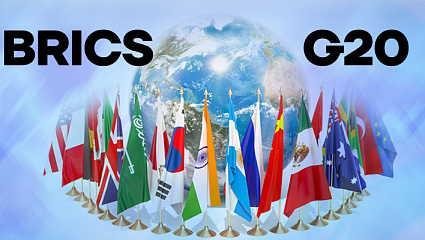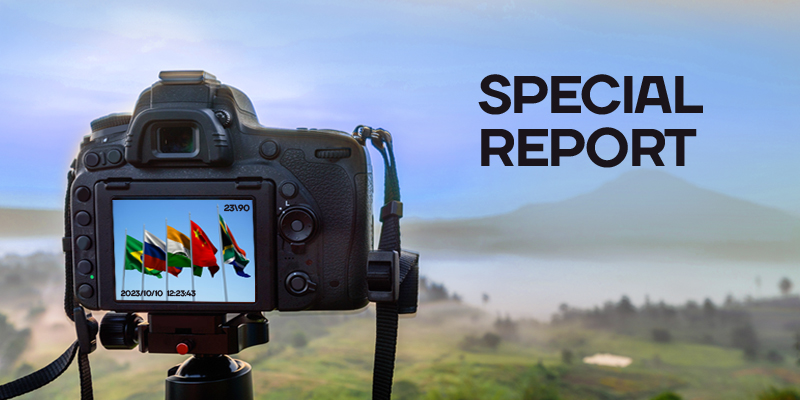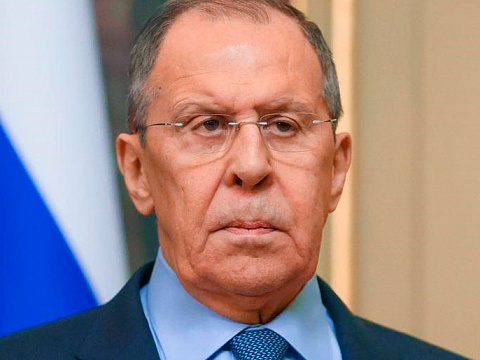Economic development of BRICS countries
BRICS is an inter-governmental grouping of five countries - Brazil, Russia, India, China and South Africa - as members. It is not an economic bloc or an international institution, but an international mechanism in the form of an informal association.
The BRICS countries occupy a unique place in the global economy. Together they produce more than 40% of world GDP and are a large global marketplace, with a combined population of around 3.2 billion (41.5% of the world's population).
The BRICS economies have a huge impact on the global market:
- China has the world's 2nd largest GDP (according to the IMF for 2022), exports the most goods and has the world's largest foreign exchange reserves;- India has the 6th highest GDP (according to IMF 2022) and a huge intellectual resource base;
- Russia is the 11th largest country in terms of GDP (according to the IMF in 2022) and has the largest mineral reserves in the world;
- Brazil is the world's 13th largest country by GDP (according to the IMF 2022 data) and has enormous agricultural potential;
- South Africa has the 34th highest GDP (based on 2022 IMF data) and is rich in natural resources.
BRICS Economic Partnership Strategy
In the economic sphere, BRICS cooperation is based on the BRICS Economic Partnership Strategy until 2025, which was developed at the initiative of the Russian Ministry of Economic Development.
The document is based on national interests, priorities and economic development strategies of all BRICS countries, the main provisions of the outcome documents of the BRICS summits, as well as Russia's concept of participation in the association. It consists of three main groups: trade, investment and finance, the digital economy and sustainable development, under which specific initiatives and activities will be coordinated.
The strategy sets out the main directions, goals and objectives for cooperation within the five countries for the period until 2025. One of the objectives of the Strategy is to consolidate efforts to overcome the economic crises caused by the spread of the pandemic and to develop effective responses to the challenges of the global economy.
BRICS Contingent Reserve Pool
The purpose of the BRICS Contingent Reserve Arrangement is to develop a mechanism for maintaining financial stability in the five countries. The agreement establishing the Pool came into force on 30 July 2015. The total amount of the reserve has been set at 100 billion USD.
The central bank of each member state sets aside a certain amount of insurance in case of financial market emergencies, which can be caused by strong capital outflows or sudden currency fluctuations. When liquidity problems arise in national financial systems, treaty partners support each other by transferring money in US dollars on an emergency, payment and repayment basis. The scheme thus serves as an insurance mechanism against short-term pressures on the balance of payments and liquidity shortages.
The total commitments made by the BRICS countries are: China USD 41 billion, Brazil, India and Russia USD 18 billion, South Africa USD 5 billion.
The Contingent Reserve Pool is regulated by the Board of Directors and the Standing Committee.
BRICS challenges
Today, a common and one of the most pressing challenges facing the BRICS countries is accelerating inflation, caused mainly by rising food and commodity prices.
Although government policy measures have somewhat eased inflation, the fight against it is still ongoing and is one of the most important challenges facing the five economies. In addition to inflation, there are other challenges, such as unstable GDP growth in member countries and the need to strengthen mutual economic ties.
However, despite all the difficulties, one should not lose sight of the significant progress in the countries' interaction and their clear desire to develop further cooperation. The high rates of economic growth and the state's favourable economic outlook have always made the Five Countries very attractive for investment.
The prerequisites for optimism about the prosperity of the alliance are geopolitics, the rich resource potential, the initial growth of mutual trade, the formation of joint financial institutions of the BRICS countries, the multifaceted economic cooperation of the BRICS countries and the accession of new member states.
Photo: istockphoto.com







 DIGITAL WORLD
DIGITAL WORLD




































